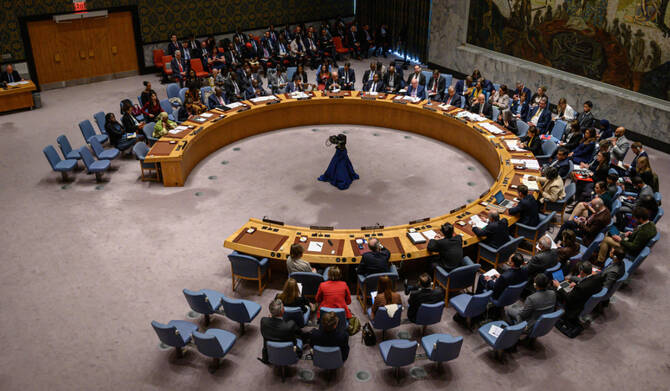NEW YORK CITY: The US on Wednesday vetoed a Security Council resolution calling for an immediate ceasefire in Gaza, the release of all hostages held by Hamas, and the lifting of all restrictions on the delivery of humanitarian aid to the starving population of the territory.
The Americans argued that the resolution would undermine efforts to reach a negotiated ceasefire agreement and failed to hold Hamas accountable for its role in igniting the conflict.
The US deputy ambassador, Dorothy Shea, said the resolution drew a “false equivalence” between Israel and Hamas and would embolden the militant group while compromising Israel’s right to self-defense.
“It is unconscionable that the UN still has not labeled and sanctioned Hamas as a terrorist organization,” she told the council prior to the vote. “Any product that undermines our close ally Israel’s security is a nonstarter.”
The proposed ceasefire would leave Hamas in a position to carry out further attacks similar to the Oct. 7, 2023, assault on Israel that triggered the ongoing war, she added.
Conditions in Gaza have worsened as Israeli authorities have intensified their military operations since the collapse in March of a previous ceasefire agreement with Hamas, and as a result of their decision to block humanitarian aid from entering the territory.
These actions have resulted in thousands of deaths, the widespread destruction of civilian infrastructure, further mass displacements, and severe risk of famine, according to the Integrated Food Security Phase Classification, an initiative that aims to improve food security analysis and decision-making.
On May 19, Israeli authorities, citing allegations that Hamas had been diverting aid, said they would temporarily permit a limited amount of humanitarian aid to enter Gaza until a new aid distribution system, developed in coordination with the US, was operational. The plan involved a the introduction of a new private organization, the Gaza Humanitarian Foundation, to bypass traditional UN-led aid-delivery systems.
The foundation recently began to distribute aid at a limited number of sites in Gaza secured by US contractors and the Israeli army. The UN and its humanitarian partners have declined to participate in the new mechanism, however, amid criticism that it is a “militarized distribution approach” that does not adhere to accepted humanitarian standards and fails to match the reach and capacity of existing aid networks.
Since the new mechanism began operating on May 27, a number of attacks by Israeli soldiers on Palestinians seeking food near aid sites run by the foundation have killed scores of people.
On June 1, several Palestinians were reportedly killed or wounded while trying to collect aid in Rafah. On June 3, about 27 people were reportedly killed when Israeli troops opened fire near the same location.
UN Secretary-General Antonio Guterres condemned both incidents in separate statements, on June 2 and 3. He called for “immediate and independent investigations” and demanded that those responsible be held accountable.
Shea said on Wednesday that the proposed resolution ignored the “shortcomings” of previous aid-delivery systems and failed to prevent Hamas from enriching itself at the expense of Palestinian civilians.
She urged fellow council members to support the Gaza Humanitarian Foundation, which she said would operate according to core humanitarian principles and ensure aid reached those most in need.
She criticized what she described as a lack of genuine negotiations during the drafting of the resolution, referring to it as a “performative process” intended to provoke a US veto.
“This council must hold itself to a higher standard,” she said, adding that American negotiators were working intensively with authorities in Egypt and Qatar to secure a deal that would result in the release of hostages, an end to the fighting, and the delivery of humanitarian assistance.
“The United States will never stop working to free all the hostages, including the remains of four Americans murdered by Hamas,” she said. “They will not be left behind.”
The resolution, the fifth one on Gaza vetoed by the US, was initiated by the council’s 10 elected, nonpermanent members. Speaking on their behalf prior to the council session, Slovenia’s ambassador, Samuel Zbogar, said the text reflected a consensus among all council members that “the war in Gaza has to come to an immediate halt, all hostages must be immediately and unconditionally released, and civilians in Gaza must not starve and must have full and unimpeded access to aid.”
UK envoy Barabara Woodward said she regretted the inability of council members to reach a consensus. She said her country voted in favor of the resolution because “the intolerable situation in Gaza needs to end.”
The UK opposes Israel’s decision to expand its military operations in Gaza, which is “unjustified and counterproductive,” she added.
She also backed UN calls for an investigation into the recent killings of Palestinians seeking food near the new aid sites.
“Israel’s new aid system is inhumane,” Woodward said. “Israel needs to end its restrictions on aid now.”




















